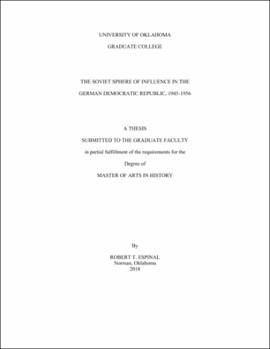| dc.contributor.advisor | Schapkow, Carsten | |
| dc.contributor.author | Espinal, Robert | |
| dc.date.accessioned | 2019-02-05T23:30:03Z | |
| dc.date.available | 2019-02-05T23:30:03Z | |
| dc.date.issued | 2018-12 | |
| dc.identifier.uri | https://hdl.handle.net/11244/317119 | |
| dc.description.abstract | In this thesis, I investigate the large impact that Soviet occupation had on what was originally the Eastern Zone of Germany, and eventually, the German Democratic Republic. Given the number of individuals in leadership positions in the GDR who had spent significant time in the Soviet Union, it was inevitable that this Sovietized mindset would be spread to various sectors of society. The timeline for this thesis begins with the chaos that was rampant in East Germany in 1945, just after the conclusion of World War II. It ends in 1956, after the Twentieth Communist Party Congress, wherein Nikita Khrushchev gave his secret speech denouncing Stalin and his actions, and ushering in a wave of de-Stalinization policies that changed the political course of the Soviet Union. After this seminal event, the influence that the Soviets once had over the GDR began to steadily wane. | en_US |
| dc.language | en_US | en_US |
| dc.subject | East German-Soviet Relations | en_US |
| dc.title | The Soviet Sphere of Influence in the German Democratic Republic, 1945-1956 | en_US |
| dc.contributor.committeeMember | Ward, Janet | |
| dc.contributor.committeeMember | Levenson, Alan | |
| dc.date.manuscript | 2018-12 | |
| dc.thesis.degree | Master of Arts | en_US |
| ou.group | College of Arts and Sciences | en_US |
